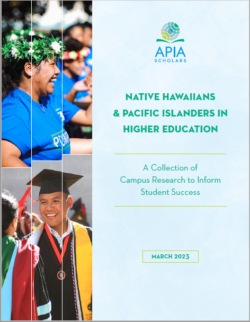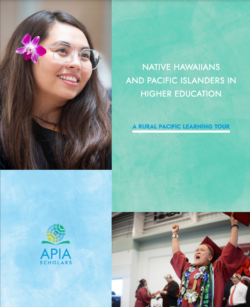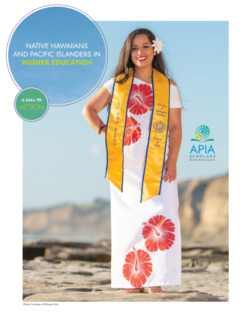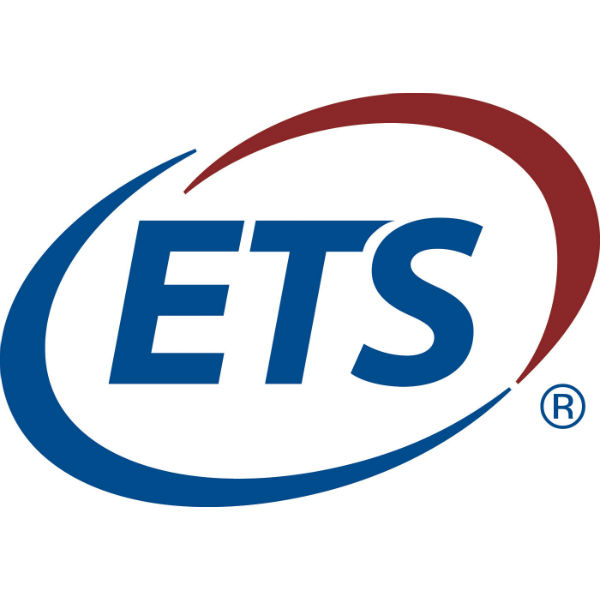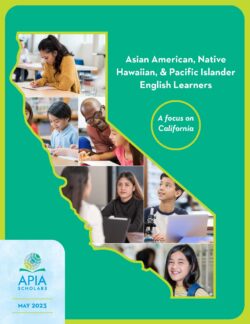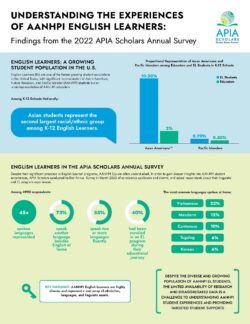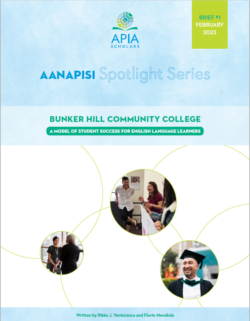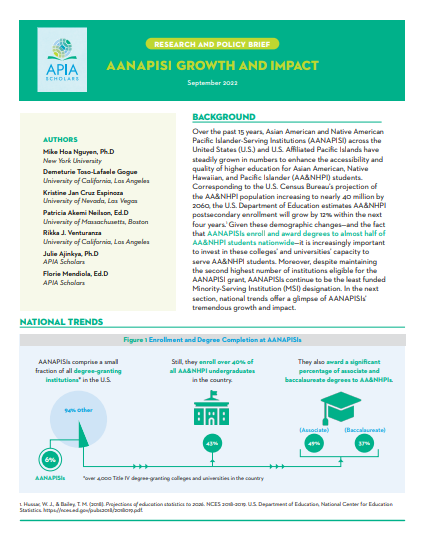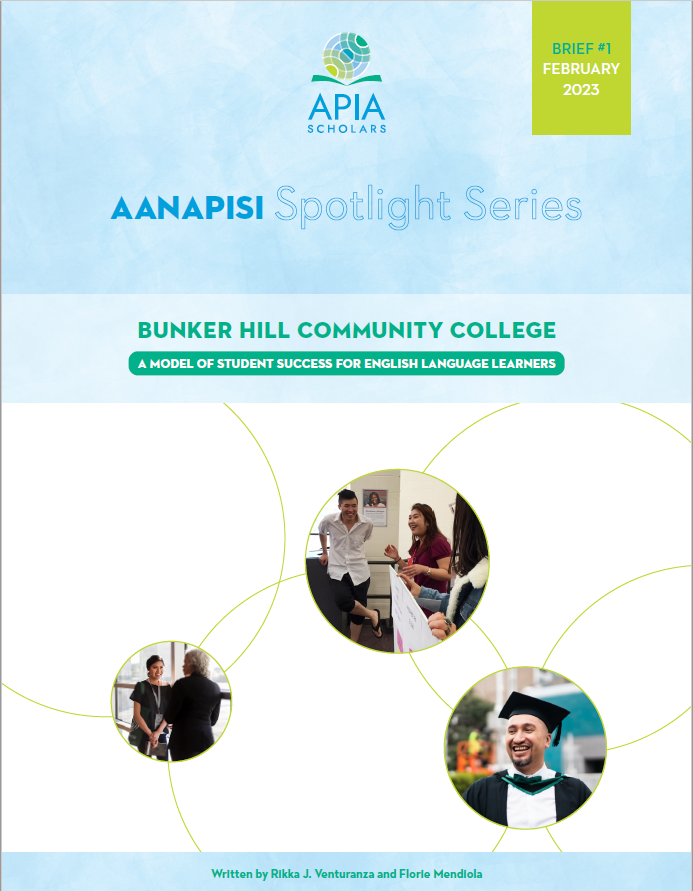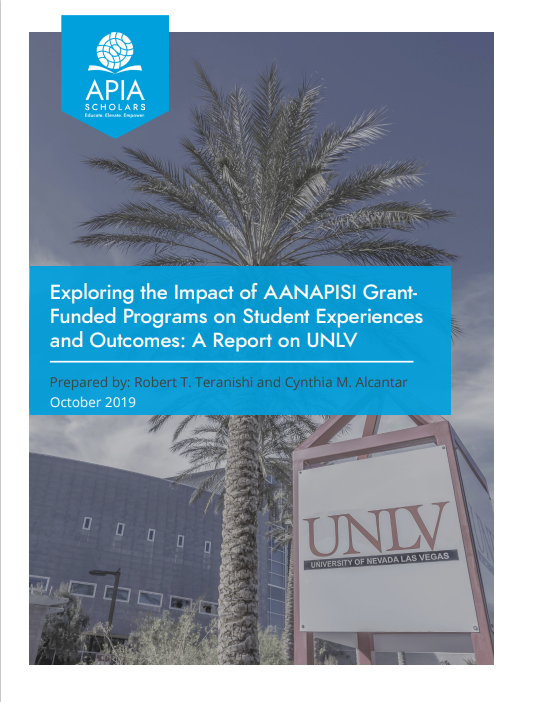Subscribe to receive all of the latest updates.
Through Research & Policy, APIA Scholars is building an infrastructure of knowledge that guides our work with our Scholars, drives our policy agenda to create systemic change that impacts Asian American Native Hawaiian Pacific Islander (AANHPI) student success, and informs broader research and policy conversations about postsecondary equity as it relates to AANHPI students.
Learn more about our NHPI research initiatives
The Role of Early APIA Mentors
NATIVE HAWAIIANS & PACIFIC ISLANDERS IN HIGHER EDUCATION: A COLLECTION OF CAMPUS RESEARCH TO INFORM STUDENT SUCCESS
This report involves collaborative research with 8 colleges to better understand the needs of NHPI student and address their challenges to increase student success on their campuses. Building upon these findings, the report identifies overarching themes relevant to key issues including data disaggregation, and the need for targeted services in higher education and concludes with institutional and policy recommendations to improve outcomes for NHPI students.
Imposter Syndrome on College Campuses
A RURAL PACIFIC LEARNING TOUR
This report provides insights into the colleges and universities that serve rural NHPI students pursuing higher education across the U.S. affiliated Pacific. These findings shed light on NHPI student experiences, as well as how institutions collect and use data to improve outcomes for NHPI students.
RESEARCH INITIATIVES
NHPI Student Success: Strengthening Institutional Capacity for Native Hawaiian and Pacific Islander Students in Higher Education
To increase Native Hawaiian and Pacific Islander student success, APIA Scholars is partnering with Asian American and Native American Pacific Islander Serving Institutions (AANAPISIs) and UCLA’s Institute for Immigration, Globalization and Education in collaborative research to impact data disaggregation, equitable supports, and school climate at the colleges and universities committed to serving NHPI students.
The NHPI Student Success Project is supported by the Ascendium Foundation, the Kresge Foundation, Nakupuna Foundation, and the General Motors Foundation.
Learn more about recommendations to support NHPI student success.
AANHPI English Learner Project
In partnership with UCLA’s Institute for Immigration, Globalization and Education, APIA Scholars will investigate how AANHPI students in California who are English Learners (ELs) have been included or excluded from EL services. This project will result in a landscape analysis of current EL programs and practices across the state of California, and policy recommendations that provide guidance to state and local policymakers for how EL supports could more intentionally serve the growing population of AAPI students across the state. APIA Scholars aims to understand the ways in which other states might be able to better meet the diverse needs of AANHPIs, the fastest growing racial group in the country.
The English Learner Project is supported by the Sobrato Family Foundation.
See the Findings About English Learners from Our 2022 Annual Survey Here.
APIA Scholars Annual Survey
In Spring 2022, APIA Scholars launched its first Annual Survey to learn more about AANHPI student experiences in higher education. The survey aims to highlight the diversity of our community and uplift the issues and barriers that impact AANHPIs as well as capture opportunities throughout the pipeline to better serve and support students. The findings will inform our forthcoming Annual “State of AANHPIs in Higher Education” Report.
Applied Research Fellowship Program
The Applied Research Fellowship (ARF) Program enables outstanding AANHPI students pursuing full-time masters and doctoral degrees to play a significant role in advancing the organization’s student research and advocacy agenda. The goal of the ARF program is to empower AANHPI graduate students to conduct applied research that uplifts prominent issues affecting AANHPI students in higher education and to utilize a policy-minded approach to devise recommendations for systemic change.
To learn more about the Applied Research Fellowship Program, click here.
The Applied Research Fellowship Program is supported by ETS.
Social Innovation Cohort
Social Innovation Fellows
Selected From
Fellowship Applications
Based On
Leadership Skills
Community Mindset
Teamwork & Collaboration
Empathy & Understanding
Our Fellows Represent
7 Women
5 Men
6 GMS Scholars
6 APIA Scholars
7 Working Professionals
2 Graduate Students
3 Undergraduate Students
Fields of Study:
- Business
- Education
- Political Science
- Architecture
- Health Sciences
- Hospitality
Institutions:
NYU, UCLA, USC, GWU, JHU, UW, Rutgers, Princeton, West Virginia University, California Polytechnic University San Luis Obispo
Learn more about our English Learner Project
AANAPISI INITIATIVE
Through the AANAPISI Initiative, APIA Scholars aims to strengthen capacity for AANAPISIs to ensure that promising practices are shared and scaled to impact more students’ lives, and that institutions receive the resources they need to serve their students well.
ADVOCACY INITIATIVES
APIA Scholars is committed to advocating for AANHPI student success in the federal policy landscape, informing policy conversations, building the visibility of AANHPI students and stakeholders, and advocating for the disaggregation of data by racial and ethnic sub-group.
Read our recent advocacy letters:

